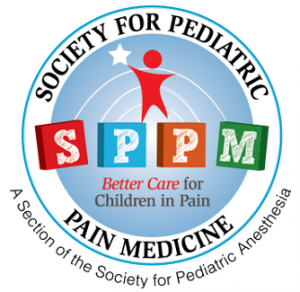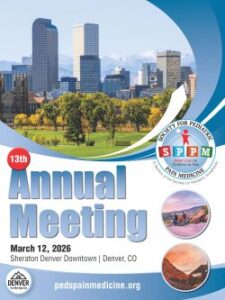
March 20, 2019
Cara Tallo
Executive Producer
Invisibilia; NPR
Dear Ms. Tallo,
The Society for Pediatric Pain Medicine is a professional organization dedicated to providing better care for children in pain, through clinical care, education, research and advocacy. We listened with interest to the NPR Invisibilia podcast “The Fifth Vital Sign”. We are encouraged to see that pediatric pain is receiving long overdue acknowledgement and attention. Your podcast has the power to influence the lives of millions as is evident from the response it has generated. When dealing with medical and health information it is imperative to represent the information in an accurate and objective manner backed by scientific facts. Personal interpretations and sensationalism run the risk of creating fear, alarm and unintended harm to the listeners.
Chronic pain involves an extremely complex interplay of neurobiological, physiochemical, and psychosocial factors, making it a subjective and personal experience, especially pertinent in the case of children. Likewise, its treatment needs to be appropriately tailored to address these factors.
The reporting in this episode of Invisibilia fails to acknowledge the scientific evidence around the neurobiology of pain or its treatments. This episode leaves the listener with an overly simplistic interpretation, by the reporter, that your pain and its treatment are simply a matter of attention (or lack thereof). Statements like “put them in pain to get them better”, “the whole point of treatment was to draw attention away from pain” “pain is how she’s going to be cured”, or “boring the pain into submission”, not only lacks scientific validity but invokes fear and panic around treatment of children’s pain while fostering mistrust of health professionals.
This type of oversimplification completely ignores and negates decades of intense scientific work that has gone into understanding the complex neurobiology of pain, or its transmission, modulation and treatments. Pain is both associated with and leads to, psychological (suffering, fear, anxiety, depression), physiological (hormonal), and structural (abnormal nerve circuitry) changes in a child’s brain, nerves and body.
The reporter mentions the risk of return to the 1950’s “grin and bear it philosophy.” We’re afraid that in its current format, this podcast is doing exactly that. Simply stated, as long as one can learn to “feel her feelings, but then push on” misrepresents the real impact and purpose of a pain rehabilitation program. The Podcast fails miserably to convey to its listeners, the scientific evidence behind the rationale and impact of a program for treatment of complex chronic pain associated with significant disability as in Devyn’s case.
Invisibilia neglects to clarify that unlike the program featured on the podcast, most pain rehabilitation programs, not only allow a child to return to a more functional and healthier life, but do so by causing physical and structural changes in the brain circuitry to reverse the damage done by chronic pain (neuroplasticity). These programs change how their brain receives and interprets the pain signals, and how it responds to those signals. These in turn affect the physical, physiological, hormonal and psychological responses by the child’s body, therefore, improving the child’s experience of pain.
The psychologic support and education around all aspects of pain are integral to treatment. Psychology provides a better understanding of the pain and its treatment, and prepares patients and families to minimize dysfunction, and cope with any setbacks, using proactive and practical means. Although different from the practice of the rehabilitation program covered in this podcast, the majority of pain rehabilitation programs also routinely utilize medications for symptom management and/or to address the underlying pathology when appropriate, compared to the “just two” which take an extreme position on medication use. However, the reporter neglects to mention the very existence of several such multidisciplinary pain rehabilitation programs, or explore the rationale behind this major difference in practice.
We, the Society for Pediatric Pain Medicine, as advocates for children’s pain care, are deeply concerned that your episode promotes the misconceptions around pediatric pain and undermines the diligent scientific discovery by scientists, doctors and clinicians over the past several decades.
Pain is NOT simply a matter of attention and psychological state of mind. It does not just respond to putting children in intense/more intense pain and teaching them to push through.
Instead, it requires a clear understanding of its complex nature and treating the physical, biological, and psychological issues carefully and simultaneously, in a delicate dance that sometimes may be harder in the beginning.
We request that NPR issues a clear statement acknowledging this oversight immediately and corrects course by creating another episode addressing these glaring missed steps. Providing perspectives from experienced pain providers and exemplifying the story of children with chronic pain who have undergone successful pain rehabilitation will provide listeners with accurate and scientifically backed information around pediatric pain. We would be happy to assist NPR in creating this resource with help of our experts.
Sincerely,
Anjana Kundu, MBBS, MD
Immediate Past President
Rita Agarwal, MD, FAAP
President
Robert T. Wilder, MD, PhD
Vice President
Yuan-Chi Lin, MD, MPH
Secretary-Treasurer, MD, MPH
Cc: Society for Pediatric Pain Medicine Board of Directors
 SPPM 13th Annual Meeting
SPPM 13th Annual Meeting